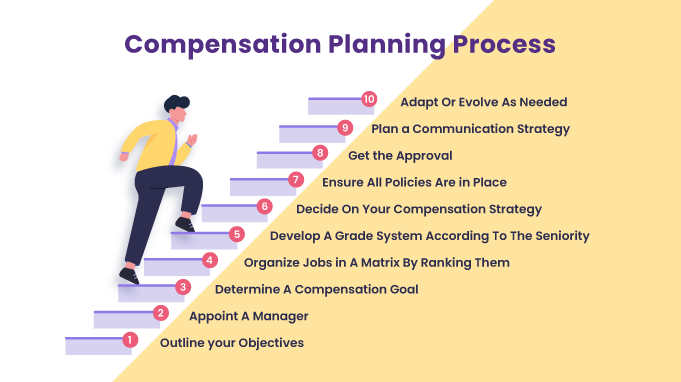A Quick And Simple Guide To Compensation Planning
As a leader, compensation planning is one of the skills you will need to master. One of the most important aspects of organizational planning is having a compensation plan that rewards employees and provides competitive pay.
76% of employees reported that their compensation is one of the first things they consider while accepting a job. Hence, compensation planning aims to put the employee in a position where they don't feel obligated to look for other employment opportunities.
The bottom line is that the better your compensation strategy is, the better your retention rates.
Through this blog, you will understand the basic idea of compensation planning for your employees and how to do it effectively.
Let's start!
What is Compensation Planning?
Compensation planning is the process of defining and implementing the strategies that will be used to attract, motivate, and retain talent. It typically involves salary, bonuses, benefits, and other types of compensation. It's important to balance what employees deserve and what employers can afford when deciding about compensation plans.
Compensation planning is an aspect of talent management. Compensation planners work closely with other departments, such as finance, accounting, and legal. They ensure the company's compliance with tax law and other regulations.
Purpose of Compensation Planning
Compensation planning is essential for all HR systems. It helps provide direct compensation for overtime, productivity, and other related activities not directly related to job duties.
In other words, compensation planning allows employees to earn compensation for their work beyond their contracted hours. It helps them get compensated without spending a great deal of their time managing their compensation accounts.
According to a report by PayScale, companies who are serious about being competitive will need to invest in solid compensation management.
The overall goal of any business is to make a profit. To do so, you need to spend less than what you make. When it comes to compensations, a few different areas need to be addressed for the company to stay profitable.
The first step is understanding how much your employees cost you. Once you have a clear picture of where your money goes, you can begin planning for the future and set goals for your employees.
Below are the objectives of a compensation plan:
- Employee Retention - Attracting and retaining qualified employees
- Employee Motivation - Motivating desired employee behavior
- Workplace Equality - Ensuring fair pay among workgroups
- Competitive Package - Providing a competitive pay structure to improve recruitment and retention prospects
- Aligning compensation with organizational objectives
- Following legal requirements.
Key Takeaway: The primary purpose of compensation planning is to achieve adequate levels of compensation, resources, and benefits. It helps prevent risk to the organization while minimizing potential losses.
Compensation Planning Process
The key to successful compensation planning is identifying the contributing factors early on in the process. Let's look at the crucial steps you need to take in compensation planning.

1. Outline your Objectives
It's important to have a clear, well-defined plan of action before you start. You need to set the objectives and targets that will dictate the success of your compensation plan.
The outline should include specific plans for how you'll allocate money to your team members based on their roles.
After that, create job descriptions for each person on the team and set a budget.
The job descriptions will help you define each position's job on the team. And a budget will help you define how much to pay your employees.
Further Reading: Management By Objectives, Its Nature And Advantages
2. Appoint A Manager
In order to make sure that your compensation plan is effective, you need someone to oversee and implement the compensation plan.
They will conduct the research needed to determine how much compensation you should pay for each position. They also help to create a plan for deciding annual salary based on performance.
The compensation manager should work with your human resources team to determine employee pay options based on factors such as:
- Company's budget
- Industry pay benchmark
- Company's organizational hierarchy
3. Determine A Compensation Goal
Having a goal and vision set for your compensation plan will drive your compensation strategy.
You do this so you can offer a package that will attract the very best talent.
Ask yourself this: how competitive do you want to be in the job market?
Do you want to offer low pay and some great benefits, or do you want to offer above-average pay with below-average benefits?
Get a clear vision of your organization's mission and then move ahead with your compensation plan.
Also check: 5 Corporations With Inspiring Company Core Values
4. Organize Jobs in A Matrix By Ranking Them
You need to rank jobs and place them within categories. It's important to organize jobs based on their level of importance and then assign them to a tier. It will help you determine your pay structures for your employees.
For example, you need to create different pay scales for mid-level executives versus entry-level executives.
While doing this, it is equally important that you should consider the jobs, the markets, and what you think people might expect.
Fact Check: Employees at larger companies are twice as likely to believe they're paid unfairly.
5. Develop A Grade System According To The Seniority
Within each job classification, develop a seniority, or grade, system that will allow for both— opportunities for advancement and changes in compensation.
Create a career ladder for each job role so that employees can achieve a position of influence and responsibility over time.
Meanwhile, your compensation planning should allow the best performers to advance and grow in their careers.
6. Decide On Your Compensation Strategy
Once you have your outline for your compensation plan and objectives, assign pay rates and a salary range for each position and job classification. This is when you fine-tune your organizational budget.
You can pay compensation in various ways, such as straight salary, salary plus commission, hourly rates, and overtime pay.
Learn more about types of compensation strategies here: Employee Compensation: How To Pay Employees?
7. Ensure All Policies Are in Place
A compensation plan will impact many policies related to payroll, fringe benefits, and other pay-related matters.
For example, companies often have policies for paid holidays, healthcare benefits, payroll administration, and company-issued pay advances. They need to factor into, or at least align, all of these with, the company's compensation plan.
It is crucial that HR also ensures these policies are up-to-date and communicated to employees.
8.Get the Approval
Once you have a plan in place, it's important to get approval from your company's other leaders before moving forward.
It's also important to keep your team members engaged and involved in the process. You can do this by making sure they know what you're working on, why it matters, and what their roles are. Once your company is aligned with your vision, you'll be able to launch the program with confidence.
In order to have a successful employee compensation plan, you'll need the support of your company's other leaders.
9. Plan A Communication Strategy
One of the most important aspects of any competitive compensation program is ensuring that all employees are aware of it.
To do this, you must communicate the plan to them using a variety of methods. Some examples are email, group gatherings, social media posts, flyers in common areas. If some employees do not speak English as a first language, ensure they receive this message in their native language.
This will ensure that they can make an informed decision about their future with your company. It will also give you insight into how to improve your compensation package for next year.
10. Adapt Or Evolve As Needed
Monitoring and adjusting your compensation can help you to maintain compliance and remain competitive. It's important to understand the legal implications of compensation decisions to ensure that they align with state and federal regulations.
You should also periodically review what you pay employees to remain competitive.
Monitor your pay practices to see if any adjustments are necessary to remain legally compliant and competitive. The changes may be small, but might be important, so be prepared for them.
"An effective compensation strategy is an important element of your talent management process as it impacts employee performance, retention, and motivation."
– Richard Riche
Factors Affecting Compensation Planning
1. Age and Education Level
The more experience a job candidate has, the higher their salary demands will be. If you're hoping to attract top-caliber talent, you should be ready and willing to compensate accordingly.
So, if you have the budget for this, then it could be worth investing in someone who will provide long-term value for your organization.
2. Industry Market
Wages for people with similar jobs can vary dramatically depending on their industry. It may be because of the differences in their skill despite being in the same job title.
One more reason could be that the industry is significantly larger than the other industries.
A job title isn't a good way to compare salary compensation across industries. Therefore, it's important to investigate the differences in how jobs are compensated across different industries.
3. Cost of Living
Salaries for similar jobs tend to increase as the cost of living rises. As an employer, you should consider the cost of living in your location when determining compensation for your employees.
The cost of living is the overall cost of expenses for a specific person or family. It can be easily calculated by adding together all of their monthly expenses.
Although, a major factor that affects the cost of living is housing prices.
For example, people who live in large cities generally have higher salaries than those in rural areas. So, cost-of-living according to the job location is a major factor influencing compensation planning.
4. Skills in Demand
It's important to remember that key skills are not necessarily the same as the job title. Key skills are more measurable. Different companies may have very different definitions of the same job title.
As a result, it's more useful to measure a person by what they actually do, not the job title that they have. For this reason, employers should consider key skills in compensation planning.
5. Availability and Demand
It's important to be aware of the supply and demand for a certain skill set in a specific location. It will help you estimate how much you'll have to pay a candidate.
If you're looking for talent in an area where the supply of talent is low, you'll often have to pay more to attract talent.
When you recruit in a certain region, make sure you analyze the wage costs and benefits there.
Wrapping Up
Compensation planning provides an anchor for developing and implementing a total reward strategy for your company. The best compensation plans will create a long-term framework for your company that includes details on the types of rewards employees receive.
A well-thought-out, and compensation plan will ensure the satisfaction of your employees and maximize their performance.

















